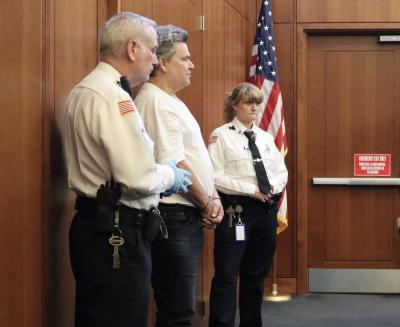Judge considers motion to dismiss jury indictment in fatal stabbing case
A Plymouth Superior Court judge will determine whether or not to dismiss a grand jury’s decision to indict David Robbins — the Onset man arrested for killing 33-year-old Yves Roux Jr. in November 2019 — for first-degree murder.
The defense’s motion to dismiss the grand jury indictment was the subject of a pretrial hearing on Monday, Dec. 14. Robbins’ defense attorney John Amabile argued before Judge Debra Squires-Lee that the evidence presented to the grand jury failed to “sufficiently establish probable cause” that Robbins committed the first-degree murder he was charged with.
Interpretations of a video from Roux’s dashboard camera were central to arguments from both the defense and the prosecution during the hearing.
In the defense’s version of events, the dash-cam footage showed that Roux was unhappy with Robbins’ slow driving on Main Street in Wareham. Roux was the aggressor in the altercation that later resulted in his death, according to Amabile.
Amabile said Roux veered right, trapping Robbins’ pickup truck against the curb. Roux then got out of the vehicle, Amabile said, and approached Robbins’ driver’s side window. Roux was yelling and threatening to kill Robbins, Amabile said, noting that the threats were audible on the dash-cam video.
During the altercation, Amabile said Robbins stabbed Roux once under his armpit. The location of the single wound was “consistent with him flailing in the window, and carrying through on his threat to kill the occupant of the pickup truck” Amabile said.
After he was stabbed, Roux attempted to drive himself to Tobey Hospital but collided with a sidewalk bump-out. He succumbed to his injuries several days later at a Boston hospital.
Assistant District Attorney Shanan Buckingham disagreed with the defense’s allegation that Roux was the aggressor.
In the prosecution’s version of events, Roux only became agitated only after Robbins escalated the conflict. First, Buckingham said Roux was forced to stop short when Robbins slammed on his breaks and then Robbins “gave him the middle finger.”
Buckingham said Roux also tried to pass Robbins’ pickup truck. At that point, according to the prosecution, Robbins veered toward Roux, which was when Roux became “audibly upset inside his vehicle.”
Buckingham acknowledged that the video shows Roux making some verbal threats, but argued a verbal altercation wasn’t enough to provoke the attack that followed. Buckingham also argued that Robbins’ truck was not trapped against the curb; she said “there might have been a brush against a car to leave” but noted that Robbins had the ability to leave the situation.
Buckingham said there was no evidence Roux had a weapon when he approached Robbins’ truck, though he was audibly angry. The prosecution did not suggest Robbins exited his vehicle, but theorized that Robbins inflicted the wound that ultimately killed Roux through the open driver’s side window.
In the motion to dismiss, Amabile argued that Robbins, a 66-year-old Wareham resident, did not commit “an intentional killing with deliberate premeditation or by extreme atrocity and cruelty,” which is one part of first-degree murder.
First, Amabile argued that there was no evidence of intent to kill.
“The place and the existence of only a single wound, indicate a lack of intent to kill or deliberate premeditation,” Amabile said. “In other words, it’s not like he was stabbed in the head or the torso or anything like that. It looked like and would only be consistent with a defensive wound, which happened to sever an artery which caused the decedent to bleed to death.”
Roux was out of his vehicle for only 11 seconds, Amabile added, arguing that the altercation happened too quickly for the killing to truly be premeditated.
Buckingham contested those arguments and opposed the motion to dismiss the indictment.
“The fact is that deliberate premeditation can form in the matter of a second,” she said. “There is time for (Robbins) to form that intent. ... He has time to arm himself with a knife. He has time to roll up his window, but he doesn’t. He has time to argue with the … victim. And he makes all those choices and still chooses to wield his weapon, to strike and deliver a very substantial blow that turns out to be fatal to Mr. Roux.”
Buckingham also argued that Robbins’ decision to continue to work as if it were a normal day after the altercation with Roux contributed to the “extreme atrocity and cruelty” portion of the first-degree murder charge.
It is unclear when Squires-Lee will make a decision on the motion to dismiss the indictment, but the hearing was continued to Jan. 21 at noon by phone conference.















